
CLEAN WATER AND SANITATION
SDG 6 advocates the importance of ensuring availability and sustainable management of water and sanitation to all. In 2020, around 26% of the global population lacked safely managed drinking water, 46% of them lacked adequate sanitation facilities and 29% lacked basic hygiene. According to National Family Health Survey 5, 95.3% of the population live in households with improved drinking water in Karnataka but drops to 88.6% in Dakshina Kannada district. 74.8% of the population live in households with improved sanitation facilities in the State and 97.1% in Dakshina Kannada district.
To achieve the goal by 2030, 6 targets were set towards achieving universal and equitable access to safe / affordable drinking water, access to adequate and equitable sanitation and hygiene, improve water quality, increase water use efficiency, ensure sustainable withdrawal and supply of fresh water, protect water related ecosystems and increase support / strengthen the participation of local communities in improving water and sanitation management.
In accordance with Government principle and Nitte DU Treated Waste-Water Reuse policy on water conservation, different wastewater generated in campus is collected and treated so that it can be used for non-potable uses like toilet flush, irrigation and water to wash vehicles. It also complies with standards of Water Act 1974 under State Pollution Control board. In 2020, Nitte DU used around 7.4 lakh litres of water per day in all the campus and around 5.8 lakh litres of wastewater generated per day was recycled to be used for non-potable purposes.
Policy on Treated Waste-Water Reuse (https:// www.nitte.edu.in/naac/2019/policies/NU_ TreatedWasteWateReuse_R0.pdf
INFRASTRUCTURE FACILITIES:
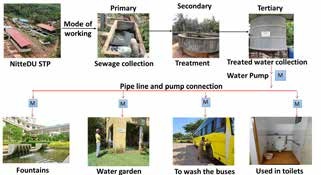
Three Sewage Treatment plants are operational within the campus of 1450 KLD capacity. These are located in JKSH Hospital campus (800 KLD), KSHEMA campus (400 KLD) and Paneer campus (250 KLD).
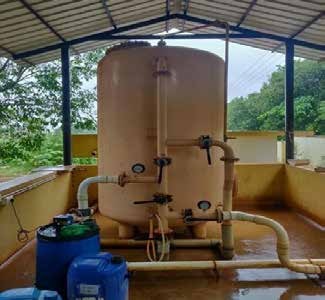
Storm water drainage system: is also operational, in which rain water from roof tops are collected using a separate pipeline, stored in raw water storage tanks. Justice K S Hegde Charitable Hospital collects approx. 2 lakhs litres, KSHEMA has the capacity of approx. 1.5 lakhs and paneer campus of approximately 1 lakh litre of rain water with a heavy shower of 30 mins. Rain water from roofs is collected using separate pipelines.
Filters are used for the treatment of rainwater collected which effectively remove turbidity, color, and microorganisms. This water is collected in raw water storage tanks which is then treated in a WTP consisting of a pressure sand filter and activated carbon filter. Additionally, chlorine demand of the water is assessed and required dosage (Sodium hypochlorite diluted to 10%) is provided using automatic dosage pumps. The treated water is stored and used.
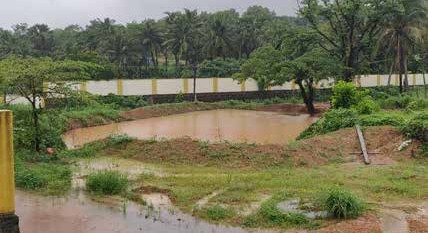
The terrain of the University is moulded for natural flow of water. The storm water is collected at the lowest point of the University campus based on contour mapping.
WATER CONSERVATION:
Sensitization and training about water conservation: Nitte DU undertakes sustained campaigns to encourage students and staff to save water.

“Every drop counts!” campaign in the campus
‘Every Drop Counts’ banners have been put in all the Drinking water outlets in the campus to promote the importance of water conservation.
BUILDING PRACTICES OF WATER CONSERVATION:
Nitte DU consciously incorporates water conservation practices while designing and constructing buildings on its campus.- Construction is compliant with National Building Code of India 2016 (NBC 2016). Standards IS1172 and IS2064 related to Water Supply, Drainage and Sanitation are adhered to.
- Water conservation guidelines from Environmental Guidelines for Buildings, Ministry of Environment, Forests & Climate Change, Government of India are also referred to.
- Some of the practices followed are:
- Use of water retaining material like cloth / gunny bags etc. during curing
- “Ponding” for retaining water on flat concrete structures for curing
- Use of curing chemicals / techniques to minimize water requirements
- Modules on environmental sustainability, including water conservation, are included in the formal curriculum of most programs
- The National Service Scheme volunteers conduct campaigns to raise awareness about water conservation
- Use of non-potable water for construction activities
- Use of water-efficient plumbing fixtures like push-cock taps
- Use of sensor-based taps
- Use of aerators, pressure inhibitors and flow regulators for ensuring constant flow
- Separate pipelines for potable water, water for recycling and treated water are provisioned for during construction
- Provision for rainwater harvesting
- Provision for management of stormwater
- Rainwater storage ponds have been created in the campus for storage of stormwater
- Rainwater from an artificially created storage pond from an external location near the campus is used. A MoU has been signed with the land-owner for use of this water
- Use of recycled water for flushing and gardening

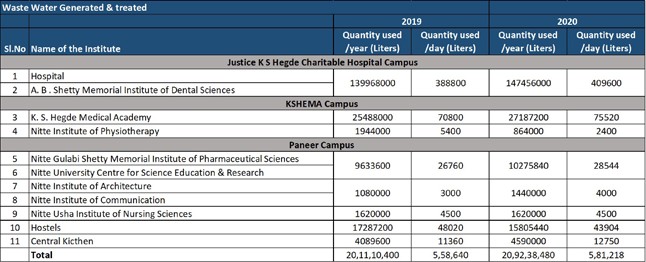
RESEARCH PROJECTS ON WATER QUALITY AND SANITATION:
Extramural funding:Vision Group of Karnataka IT & BT, Government of Karnataka has granted an amount of Rs. 25 lakhs to NUCSER for establishing a Centre for Developing Sustainable Technologies for Mitigating Heavy Metal Pollution Under Changing Environment under the Centres of Innovative Science & Engineering Education (CISEE) scheme to Prof. Dr. Smitha Hegde. Conventional techniques for removing heavy metals from industrial effluents include procedures like chemical precipitation, reduction, adsorption, ion exchange, evaporation and membrane processes. Often these involve use of additional undesirable chemicals. There is an urgent need to explore the possibilities of mitigating heavy metal pollution by eco-friendly, economically viable and sustainable methods. The centre is working towards knowledge generation and technology development along with generation of trained manpower to address pollution issues.
Intramural funding: Nitte DU
Nitte DU provides generous funding to staff and students supporting their research activities relevant to pressing needs of the society, such as studies on “Geospatial distribution of Fluoride in Natural water sources in Mangalore city” to test the well water in 60 different wards of MCC by Dr. Smitha Hegde; A study on detection of Vibrio parahaemolyticus associated with diarrhoea samples by Dr. Biswajit Maiti; A study on Isolation and activity evaluation of Bdellovibrio from hospital effluents against biofilm forming Pseudomonas aeruginosa by Dr. DivyashreeM. Several studies are under progress on micro and nanoplastics in drinking water. A study on detection of micro and nanoplastics in bottled water and evaluation of the associated health effects using zebrafish model system was completed by Dr. Rajeshwari Vittal, NUSCER Nitte Institute of Architecture conducted research on Water strider waste gatherer design that can be deployed in water bodies to gather waste floating on surfaces. A study on Rejuvenating the Vrishabhavathi river through addressing the built was undertaken by Ms. Kavya Amin, Nitte Institute of Architecture. A Rejuvenation project of Sulthan Battery and its immediate context was completed by Mr. Harikiran, Ms. Shahana and Ms. Nabeela.
WATER CONSERVATION AND COMMUNITY AWARENESS:
Students and staff of Nitte DU are engaged in promoting responsible use of water in the community too. Some of the recent activities related to water conservation include: The students of the Department of Public Health, KSHEMA, have developed a short video titled “Jala” to observe World Water Day.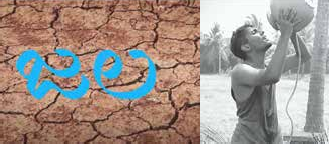
- Nitte Institute of Architecture organized an Expert Lecture on “The Identity of Water - Traditional knowledge for a resilient future” by Ar. Mohan Rao, on Saturday, 5th December 2020, at 15.30 IST.
- Dr I Karunasagar and Dr Smitha Hegde, faculty of Nitte (Deemed to be University) gave a talk on “Water and environment” on Manipal Radio, a Community Radio station
- Public lecture on rainwater harvesting by Ms Sweata Pradhan, Assistant Professor, Nitte Institute of Architecture
- Ar. Sweata Pradhan delivered a lecture on rain water harvesting at St Aloysius College Mangalore, on 06-06-2019. This was attended by over 2000 pre-university students and teachers. It focused on the importance of rainwater harvesting and outlined of a simple method for calculating and demands for water and the available supply of water.
- Promotion of rainwater harvesting offcampus - Nitte DU purchases rainwater via a dedicated pipeline from an artificially
created rainwater harvesting pond from an external location near the campus. This promotes rainwater harvesting storage at
this off-campus location.
Nitte DU in association with the District Administration and KSPCB conducted a oneday awareness program on 24th January 2020 on ‘Bio-Medical Waste Management - Present Status and Future directions’ for medical, nursing and biomedical professionals: Smt. Sindhu B. Rupesh, Deputy Commissioner, Mangalore, Sri.Lakshmikantha, Environmental Officer, KSPCB, Karwar, Shalini Pradeep, Professor, Ramaiah Medical College, Bangalore were present. The program was attended by over 500 registered participants deputed by district administration from 50 medical institutions of the region.


ABSMIDS was recognized Swachhta Action Plan Institution, for post COVID-19 Sanitation & Hygiene, Waste management, Water management, Energy management and Greenery on 12th August 2020
A public awareness program for Karnataka State Reserve Police (KSRP) personnel, was held on 11th November 2020 by the Department of Community Medicine, KSHEMA. The topics covered included Health & Hygiene, Sanitation and First Aid. 40 KSRP personnel from different parts of the state participated in the program.
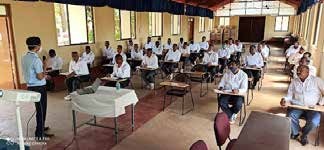


.png)